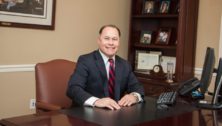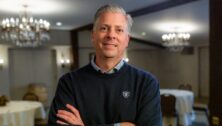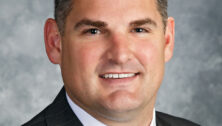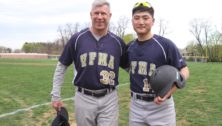Montgomery County Leadership: Nicholas Torres, Interim CEO and President, The Alliance for Health Equity
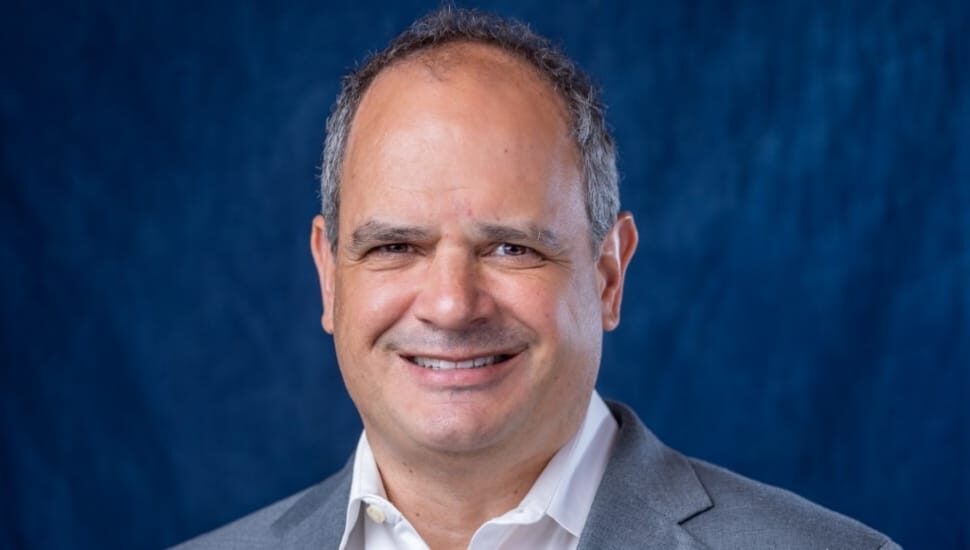
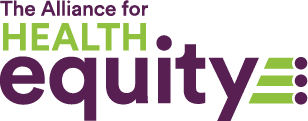
Nicholas (Nick) Torres, interim CEO and President of The Alliance for Health Equity, spoke to MONTCO Today about growing up in New Mexico, his many part-time jobs starting at age 12, and his passion for soccer. He also recalled how he chose Carleton College and later moved to New York City for Teach for America.
Torres discussed his work at Congreso de Latinos Unidos, where he started out running youth services and worked his way up to director. He also spoke about his work with The Alliance for Health Equity, which focuses on health access and local impact investing in Coatesville.
Where were you born, and where did you grow up?
I was born the middle child of five children in Santa Fe, New Mexico. That land used to be part of Mexico, so I like to say that the border crossed us, we didn’t cross the border. The border crossed my grandparents or great-grandparents, and they became U.S. citizens.
What did your parents do for a living?
Both my parents were educators. My dad was a junior high physical education teacher for 29 years. My mom eventually left the public school system and started a private tutoring company for special needs kids.
What memories do you have of growing up in Santa Fe?
Santa Fe is like a cultural mecca. It has the natives who grew up there, the art scene, which brings in mostly Caucasians and the indigenous community.
My memories are of going to school and working. I worked my entire life, ever since I was 12. Outside of school and work, my outlet was playing soccer, which I did until I was 40.
When we went to downtown Santa Fe, I remember thinking, “Everything is so expensive. Who can actually pay for these things?”
Were you good at soccer?
I was good enough to play in Division III, so I started and played college soccer for four years.
Do you have a favorite soccer game or a memory that stays with you?
In college, we were a middle-tier team. We won as many as we lost. I remember one game that we were down 3–0.
But the second half turned around, and we ended up winning by scoring three goals. That kind of excitement, when you’re coming back and winning, is the best feeling.
You said you were always working. What kind of jobs did you have while you were growing up?
My parents got divorced when we were young, so it was always a single-parent household. If we wanted money, we had to get a job. My first job was in seventh grade as a paper boy. I had to get up at 5:00 in the morning — it was always freezing — and deliver papers. I then came back, took a shower, and went to school. That taught me a good work ethic.
I went from that to bagging groceries once I was 14. Then I went to a “posh” job as a lifeguard, which was the best job ever because you had downtime. They had a rotation cycle, so I got all my homework done when I was off rotation. And in college, I had a work study job running a computer labs.
What lessons did those jobs teach you that still impact how you work Today?
A strong work ethic. My biggest struggle is that it’s hard to relax when I’m not working.
Where do you get that work ethic from? Was it your parents or survival and wanting to have money?
A combination of both, but it was mostly my parents. My mom ventured out and became an entrepreneur when she launched her own business. It’s much harder than being a teacher and getting a steady paycheck.
What kind of music were you listening to as a teenager?
My siblings followed the fads of music, but I was always the kid who was left behind and didn’t know what the new music was. I listened more to oldies, the songs that my parents liked. I liked Bryan Adams, UB40, The Proclaimers, and Cat Stevens.
Then I went through a phase when I studied in Mexico and Puerto Rico and got very into Latin music. That was all I listened to for almost 10 years.
You said you played soccer in college. Where did you go to college, and why there?
I went to Carleton College, a small, liberal arts college south of Minneapolis. I didn’t know where to apply, so I looked at U.S. News and World Report and saw that Carleton College was number three. My mom was from the Twin Cities, and it had a soccer program, so it seemed like a good fit. I applied for early admission and got in with a great financial aid deal. That was my only college application.
Looking back, was Carleton College a good choice for you?
Yeah. It’s very liberal. The other liberal arts schools are more conservative. Carleton fit my mental framework of what we need to do with society and how to move forward.
Culturally, it could have been a better fit. There were a lot of Midwesterners there, and when you’re from a different part of the country, you don’t necessarily fit in.
Who were the people who saw promise in you, opened up doors, and made things possible for you?
My first question when I was graduating was, “What am I going to do?” Teach for America popped up, and I decided to be a teacher. That was the first door that opened. I thought I’d be in the Rio Grande Valley of Texas because I was bilingual, but they needed bilingual teachers in New York City.
That’s what led me to Puerto Rico. I ended up dating one of my Teach for America colleagues, who was Puerto Rican, and I went back and forth between Puerto Rico for four years. She and I lived in New York for two years, finished Teach for America, and got our master’s degrees at the University of Texas at Austin. Then I ended up back on the East Coast because she was getting her doctorate at Penn. At that point, I said, “I’m done moving.” That was in 1997 or 1998; I’ve been here ever since.
This is where I started my job at Congreso de Latinos Unidos, where I was running youth services. That was the next door that opened. Two and a half years later, I was running it. The previous director left, and the board did an extensive search and hired somebody, which didn’t work out as planned. We organized internally and educated the board know about the internal challenges. The board made me the interim and eventually the permanent director.
What did they see in you, Nick?
I think it was accountability and getting things done. Going back to that work ethic — I’m not sitting back; I’m more of a plow horse.
Back then, I wasn’t necessarily the “polished” executive, but I think they saw my success in that I had been at Congreso for two and a half years, and I’d built the youth services division from a half-a-million-dollar shop to a three-million-dollar shop in that time.
They saw the results and the partnership. They saw, “He’s a doer. We need a doer.” I eventually became the “polished” executive and am both an external and internal leader.
Is there anybody else who opened up a door for you in your career?
The board chair at Congreso, Ken Trujillo, was a major political figure. He opened a lot of doors for Congreso and for me. And there were lots of other individuals along the way.
How did you end up at the Alliance for Health Equity?
In 2018, I got a call from a colleague about working with the Network Towards Unity for Health, which is a non-state actor of the World Health Organization. I was doing a lot of consulting and social innovations. I ended up running that organization and am still supporting that organization on governance and strategy, and financial backing.
That took me head-on into healthcare. I’d been leaning toward healthcare before – with a colleague, I co-founded the school-based health centers in Philadelphia, which is another nonprofit — but I’d never been in healthcare myself.
A mutual colleague of mine, Vanessa Briggs, was running the Alliance and wanted to work on collective impact. I started consulting with the Alliance three or four years ago on collective impact work.
Vanessa needed a chief operations officer to do equity work. For nine months, I kept suggesting candidates. Then, one day, about a year and three months ago, I was doing this global work, which is virtual, and I woke up and said, “I can’t do this anymore. I can’t sit behind a computer.” I called her and said, “If you’re still looking for that operations person, I might be interested.”
I started at the Alliance about a year ago as its chief operations officer. Then, about two months after I started, Vanessa announced her departure for another opportunity. The board said to me, “Guess what? You get to be interim CEO and president.” That was back in August. The search process will conclude next month.
Describe briefly what the Alliance for Health Equity does.
The Alliance used to be known as the Brandywine Health Foundation. We’re a foundation — we give about $1.2 million in grants — but that’s not our primary role. We’re focused on greater Coatesville, which is a pocket of poverty in Chester County, the wealthiest county in Pennsylvania. Our role is the deployment of capital, very strategically, so that all boats are rising, but we’re starting with health.
When the Brandywine Hospital closed, we served in that capacity of convening the stakeholders — government, nonprofits, private sector, and community residents — to say, “We just lost our hospital; what are we going to do about it?”
We applied for American Rescue Plan Act funds, not to deliver health but to remove barriers for people with lower socioeconomic status to access healthcare.
It’s all framed under this anchor strategy of how you integrate healthcare delivery with access issues such as transportation, communication, education, and the social determinants of health, which are the underlying issues of poverty, housing, and the workforce.
The second thing we do is lead the nonprofit Justice and Equity Institute. Nonprofits — and for-profits and government — need to move the idea of diversity, equity, and inclusion from policy to practice. This institute helps nonprofits do that.
The last thing we do is deploy capital through grants and local impact investing. We’re starting to take our corpus and say, “Let’s not just invest in Wall Street and get five-percent returns. Let’s invest locally.” That could be in housing, workforce, or hospitals. You’re going to get a social and financial return.
What initiatives and priorities are you focused on in the next three to six months?
We’re spearheading this cross-sector-convening, place-based anchor strategy that integrates health delivery, access systems, and social determinants of health into one. You’ve got everybody in Chester County — the county commissioners, the Health and Human Services directors, the business community, the Chamber of Commerce, the manufacturers, the community, the health delivery systems, and medicine — sitting at the table to collectively drive this initiative.
Secondarily, we’re trying to scale the Nonprofit Justice and Equity Institute. And the deployment of capital follows those strategies.
Coatesville is right on that critical point of revitalization. You’ve got the train station, the sports center coming in, and investors buying up properties. Our question is, “What about the current residents?” Coatesville residents have a 40% homeownership rate versus 75 percent in Chester County. Can you move the residents of Coatesville into homeownership, or will they be displaced? We’re trying to maintain the Coatesville residents in Coatesville.
So, what do you do with all your free time, Nick?
I’ve got three daughters — 12, 14, and 17. When I’m not working, I’m usually cooking or being a taxi driver for them.
In my extra free time, I teach two courses at Penn. And I’ve got my own boards that I’m a part of. I’m still supporting the Global Network of Global Health and publishing the Social Innovations journal. There’s not much free time besides that, besides exercising.
Do you read much?
I’ve started to read more, but usually, I do audiobooks, nonfiction, or educational stuff while I’m walking. When I’m reading on my own, I’ll pick up a novel, usually historical fiction or something that’s easy to read and takes my brain off things.
I have three last questions. What have you changed your mind about in the past five years?
The major thing is how I operate. When you lead an organization, there’s this idea that you have to play the politics. If you’ve ever read Machiavelli, it’s the idea that everybody’s trying to screw you over and take your money or your power. That’s true, but I decided that to be an authentic leader, I had to be transparent, accountable, and open about everything. It goes against some of these best practices like “Don’t tell your board this,” or “Don’t tell your staff that,” or being manipulative.
I learned that when I started doing international work. At first, I was surprised, like, “They tell the board everything!” Then I realized that’s actually a great way to do it. Now, I’m authentic and transparent about all my work. Whenever I’m in a dilemma or have a difficult choice I always choose transparency and authenticity. If it’s not good news, it’s not good news, but you just tell it.
It’s a crazy world out there, Nick. What keeps you hopeful and optimistic?
It’s hard to be optimistic about the changes in the world. I heard someone say, “Our world is in dire straits — you’ve got a war going on, the wealthy getting wealthier, the poor getting poorer — but let’s talk about where we were a hundred years ago. People were starving, and you didn’t have stable healthcare. We’re living in the best time in world history — ever.”
That’s true. But what most keeps me hopeful is that people still dream and strive to improve their and their family livelihoods. There’s much hope and energy as long as you open a door or provide a platform. And it’s not just young people — if you open a door, people will show up and work hard to improve themselves, their families, and their communities. So, my focus is to just keep opening those doors for others and help them live their full potential.
Finally, Nick, what’s the best advice you’ve ever received?
One of them was when I was at Congreso. I’d made a political mistake and was like, “What do I do?” Ken Trujillo said, “Just fall on your sword. It is what it is. Don’t try to get out of it.” I’ve always kept that in mind. When you make mistakes, fall on your sword, own up to it, and move on.
The second one, more of a self-realization of how I need to operate, is that we can play so many roles in this world, but all you can do is be the best you. I go through life saying, “This is what I have to offer. I’ll be the best me. There may be some things I’m not good at, but here’s what I am good at.”
Stay Connected, Stay Informed
Subscribe for great stories in your community!
"*" indicates required fields



![95000-1023_ACJ_BannerAd[1]](https://montco.today/wp-content/uploads/sites/2/2023/03/95000-1023_ACJ_BannerAd1.jpg)















![ForAll_Digital-Ad_Dan_1940x300[59]](https://montco.today/wp-content/uploads/sites/2/2022/06/ForAll_Digital-Ad_Dan_1940x30059.jpg)
















